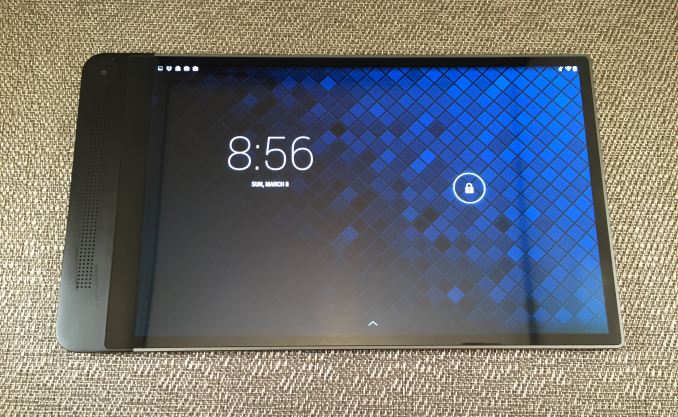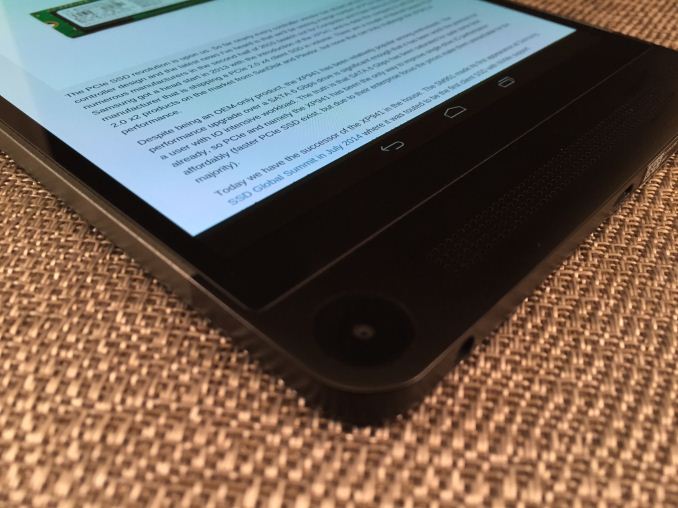The Dell Venue 8 7000 Series Review
by Brandon Chester on March 12, 2015 8:00 AM EST- Posted in
- Tablets
- Dell
- Android
- Mobile
- Venue 8 7000
Final Words
The Dell Venue 8 is a tablet that I really wanted to like. From the moment I unboxed it, it had a level of craftsmanship that I have seldom seen in other Android tablets. The aluminum casing is rigid and sturdy, which is a breath of fresh air compared to the flex that many plastic tablets exhibit. It's extremely thin, and it manages to be lightweight without going overboard and feeling like an empty demo unit. Although the design of the bezels gives it a somewhat unbalanced appearance, the Venue 8 is still a very well designed tablet.
It's clear that Dell has aspirations of becoming a serious competitor in the high end tablet space. Although the Venue 8 gets high marks for its design, a tablet can't survive on that alone. It needs to hold its own against the competition in every area, from the design, to the display, to the SoC. When you intend to sell a device for $399, there's very little room to compromise on any aspects without falling short of the competition.
Going over the Venue 8's strengths beyond its design, we find that it does quite well in our CPU tests. The Intel Atom Z3580 manages to hold its own against the competition's high end ARM SoCs, and at this point the list of applications that don't run on Intel devices consists of only a tiny handful of Android NDK apps. Its speed also doesn't come at the cost of battery life, with the Venue 8 trading blows with the competition in our battery tests.
Unfortunately, the Venue 8 isn't able to stand up to the competition in several other aspects. At $399, the Venue 8 is going right up against the Nexus 9, and there are just too many areas where it falls short. The most significant in my view is the display. The color accuracy is honestly unacceptable for a $399 device, and a 2560x1600 PenTile RGBG display has more subpixel pattern visibility than an 8.9" 2048x1536 RGB display. The GPU performance of the Venue 8 also leaves much to be desired compared to Tegra K1-64. It's not bad, but the competition is just a lot better.
There's also the issue of software. Not applications, but Android itself. The Venue 8 ships with KitKat, and there's no solid information on when it will be upgraded to Lollipop. Beyond that point, buyers just have to hope that Dell continues to provide updates, while with the Nexus 9 they're guaranteed them from Google for a fairly long period of time. Venue 8 users also have to deal with the OS and preinstalled software eating up 7GB of their 16GB device, and while microSD cards can expand media storage, they can't expand application storage.
While I could go on and on and compare every aspect of the Venue 8 to other tablets, I think the data speaks for itself. The build quality is much better than that of the Nexus 9, there's no question about that. However, in every other aspect it either matches the Nexus 9, or ranges from not quite as good to significantly inferior. With that in mind, it's hard to give a recommendation for the Venue 8 given its price. I strongly value good design and build quality, and the Venue 8 holds that over the Nexus 9. Unfortunately, that advantage isn't enough to outweigh all of the disadvantages. The Venue 8 just isn't enough to become my recommended Android tablet for $399. It's clear that Dell has put a lot of effort into creating the Venue 8, but they still have a ways to go.












89 Comments
View All Comments
Drumsticks - Thursday, March 12, 2015 - link
Indeed. I haven't noticed a slowdown on any of my devices, including a surface Pro 1 and a 4570k based PC.Sushisamurai - Sunday, March 15, 2015 - link
Ditto, IPad Air 2, iPad retina mini, ivy-bridge i7-U, my mother of a desktop, iPhone 4S and even my Nokia 830 run this fine. :(Ryan Smith - Thursday, March 12, 2015 - link
If you could please email me some screenshots of the ads in question, I will have it looked it.http://www.anandtech.com/Author/85
damianrobertjones - Thursday, March 12, 2015 - link
Read the specs, all sounded good, until I reached "Android 4.4.4 KitKat".Oh well.
Michael Bay - Thursday, March 12, 2015 - link
You should have stopped at Android.Michael Bay - Thursday, March 12, 2015 - link
Android?Jesus, what a way to kill a perfectly fine hardware mix.
Azurael - Thursday, March 12, 2015 - link
They make a Venue 8 Pro if you want to run Windows/Linux... Pretty dull looking, but at least it doesn't have stupid bezels.Azurael - Thursday, March 12, 2015 - link
If anybody wants a point of comparison with a Haswell-Y tablet, my i3 4020Y-based Dell Venue 11 scores the following running an Android-x86 5.0.2 build from a few days back (it's an x86_64 kernel w/ 32-bit userspace):Kraken 1.1 - 2741.8ms
Octane 2.0: 10668
WebXPRT kills Chrome for some reason (as does one of Vellamo's benchmarks) - I'm assuming that's something to do with the MESA/i915/Android interaction that Android-x86 creates. It worked under 4.4 and 5.0 is unofficial and buggy ATM.
BaseMark OS 2 hates this thing:
Overall: 1361
System: 1893
Memory: 1486
Graphics: 1572
Web: 776
And I know AT don't use it, and it's not exactly known for accuracy and consistency but AnTuTu 5.6.1: 50757
There's a lot of optimisation to be done, and it'd be nice to get 64-bit userspace working... But if Intel's slowest Haswell dual core can do that, think what the higher spec devices could do!
Kidster3001 - Wednesday, April 1, 2015 - link
Basemark OS2 for Android scores incredibly poor on all x86 devices. I don't recommend it as a benchmark for Android.darkich - Thursday, March 12, 2015 - link
"With generational improvements to their processors, it's not hard to imagine Intel becoming a major performance leader in the mobile space"In your dreams?
How in Earth will Intel even come remotely close to achieving that in the light of Tegra X1, Exynos 7420, and upcoming army of Cortex A72 based chips?!?
Wow, their newest Atom- built on a superior process to any of the compared chips, some of which being more than a half year old - held its
ground in CPU, and got owned in GPU tests.
I'm amazed at how your Intel has can translate that into some kind of promising prospect for Intel.
Wake up and see that in reality, Intel IS FAR BEHIND, and has nothing to counter the upcoming ARM chips.
The next Atom is basically a die shrink of Silvermont, and should be absolutely demolished by 14-20nm chips with Cortex A72 and Kryo CPU cores.